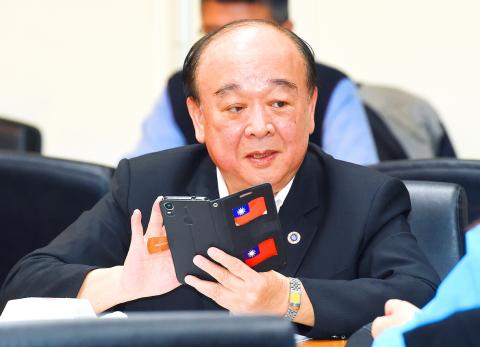Several lawmakers yesterday expressed concerns about Chinese Nationalist Party (KMT) Legislator Wu Sz-huai (吳斯懷) requesting information from the Ministry of National Defense for information — which reportedly included highly classified materials on military units.
Wu, a retired lieutenant general, previously sparked controversy when he reportedly attended an event in China commemorating the 150th birthday of Sun Yat-sen (孫逸仙) in 2016, when he sat through a speech by Chinese President Xi Jinping (習近平) and stood for a rendition of the Chinese national anthem.
The ministry on Thursday confirmed that Wu had requested information, with local media quoting a ranking officer as saying that the requests included materials on cyberdefense units at the new Information and Electronic Warfare Command and troop deployments for all three major branches of the armed forces, as well as updates on combined service units and military operations plans.

Photo: Liao Chen-huei, Taipei Times
Democratic Progressive Party (DPP) Legislator Wang Ting-yu (王定宇), who serves on the Legislative Yuan’s Foreign Affairs and National Defense Committee, said that while Wu is a retired officer, he sits on the legislature’s Social Welfare and Environmental Hygiene Committee, so he should focus on the tasks and issues concerning that panel.
“In addition to requesting information on cyberdefense units, Wu also inquired about the indigenous submarine development program. His actions are worrying and his motives are certainly questionable,” Wang said on Facebook yesterday.
The pro-independence Taiwan Statebuilding Party issued a statement condemning Wu.
“With the global Wuhan virus outbreak, China has stepped up its misinformation campaign, but Wu has not said a word. Now he wants to access classified information on Taiwan’s cyberwarfare units. We have to ask, is Wu collaborating with China from inside the legislature?” the party said.
While Wu’s requests are within the authority of a legislator, the doubts of the Taiwanese public must first be cleared up, Taiwan Statebuilding Party Legislator Chen Po-wei (陳柏惟) said, asking Wu: “Which side are you on? For whom do you fight?”
“Taiwanese know who we are fighting … that the enemy is China,” he added.
However, several KMT members defended Wu, saying that requesting information from government agencies is within the scope and authority of legislators.
As veteran, it is reasonable for him to request white papers and other reports from the ministry, Wu said, adding that contrary to media reports, he only requested public information, not “classified military materials.”
In a short statement, the ministry said that it had provided Wu with publicly available information, adding that lawmakers are authorized to make such requests in accordance with the legislature’s oversight role.
Additional reporting by CNA

CHAOS: Iranians took to the streets playing celebratory music after reports of Khamenei’s death on Saturday, while mourners also gathered in Tehran yesterday Iranian Supreme Leader Ayatollah Ali Khamenei was killed in a major attack on Iran launched by Israel and the US, throwing the future of the Islamic republic into doubt and raising the risk of regional instability. Iranian state television and the state-run IRNA news agency announced the 86-year-old’s death early yesterday. US President Donald Trump said it gave Iranians their “greatest chance” to “take back” their country. The announcements came after a joint US and Israeli aerial bombardment that targeted Iranian military and governmental sites. Trump said the “heavy and pinpoint bombing” would continue through the week or as long

TRUST: The KMT said it respected the US’ timing and considerations, and hoped it would continue to honor its commitments to helping Taiwan bolster its defenses and deterrence US President Donald Trump is delaying a multibillion-dollar arms sale to Taiwan to ensure his visit to Beijing is successful, a New York Times report said. The weapons sales package has stalled in the US Department of State, the report said, citing US officials it did not identify. The White House has told agencies not to push forward ahead of Trump’s meeting with Chinese President Xi Jinping (習近平), it said. The two last month held a phone call to discuss trade and geopolitical flashpoints ahead of the summit. Xi raised the Taiwan issue and urged the US to handle arms sales to

BIG SPENDERS: Foreign investors bought the most Taiwan equities since 2005, signaling confidence that an AI boom would continue to benefit chipmakers Taiwan Semiconductor Manufacturing Co’s (TSMC, 台積電) market capitalization swelled to US$2 trillion for the first time following a 4.25 percent rally in its American depositary receipts (ADR) overnight, putting the world’s biggest contract chipmaker sixth on the list of the world’s biggest companies by market capitalization, just behind Amazon.com Inc. The site CompaniesMarketcap.com ranked TSMC ahead of Saudi Aramco and Meta Platforms Inc. The Taiwanese company’s ADRs on Tuesday surged to US$385.75 on the New York Stock Exchange, as strong demand for artificial intelligence (AI) applications led to chip supply constraints and boost revenue growth to record-breaking levels. Each TSMC ADR represents

State-run CPC Corp, Taiwan (CPC, 台灣中油) yesterday said that it had confirmed on Saturday night with its liquefied natural gas (LNG) and crude oil suppliers that shipments are proceeding as scheduled and that domestic supplies remain unaffected. The CPC yesterday announced the gasoline and diesel prices will rise by NT$0.2 and NT$0.4 per liter, respectively, starting Monday, citing Middle East tensions and blizzards in the eastern United States. CPC also iterated it has been reducing the proportion of crude oil imports from the Middle East and diversifying its supply sources in the past few years in response to geopolitical risks, expanding